 Tìm kiếm
Tìm kiếm
Phần thứ năm Bộ luật Tố tụng hình sự 2015: Một số quy định về thi hành bản án, quyết định của Tòa án
| Số hiệu: | 101/2015/QH13 | Loại văn bản: | Luật |
| Nơi ban hành: | Thủ tướng Chính phủ | Người ký: | Nguyễn Sinh Hùng |
| Ngày ban hành: | 27/11/2015 | Ngày hiệu lực: | 01/01/2018 |
| Ngày công báo: | 31/12/2015 | Số công báo: | Từ số 1271 đến số 1272 |
| Lĩnh vực: | Trách nhiệm hình sự, Thủ tục Tố tụng | Tình trạng: | Còn hiệu lực |
TÓM TẮT VĂN BẢN
Bộ luật tố tụng hình sự 2015 vừa được ban hành ngày 27/11/2015 với nhiều quy định mới về cơ quan tiến hành tố tụng và người tiến hành tố tụng hình sự; người tham gia tố tụng HS; bào chữa, bảo về quyền và nghĩa vụ của bị hại, đương sự; biện pháp ngăn chặn, biện pháp cưỡng chế;...
Bộ luật tố tụng hình sự năm 2015 gồm 9 Phần, 36 Chương, 510 Điều (thay vì Bộ luật Tố tụng Hình sự 2003 gồm 8 Phần, 37 Chương, 346 Điều). Bộ luật TTHS 2015 gồm các Phần sau:
- Những quy định chung
- Khởi tố, điều tra vụ án hình sự
- Truy tố
- Xét xử vụ án hình sự
- Một số quy định về thi hành bản án, quyết định của Tòa án
- Xét lại bản án, quyết định đã có hiệu lực pháp luật
- Thủ tục đặc biệt
- Hợp tác quốc tế
- Điều khoản thi hành
Bộ luật tố tụng HS 2015 có một số quy định nổi bật sau:
- Điều 73 về quyền và nghĩa vụ của người bào chữa
Người bào chữa có quyền quy định tại Khoản 1 Điều 73 Bộ luật 101/2015/QH13, trong đó có quyền:
+ Gặp, hỏi người bị buộc tội;
+ Có mặt trong hoạt động đối chất, nhận dạng, nhận biết giọng nói và hoạt động điều tra khác theo Bộ luật tố tụng hình sự 2015;
+ Xem biên bản về hoạt động tố tụng có sự tham gia của mình, quyết định tố tụng liên quan đến người mà mình bào chữa;
+ Đề nghị tiến hành hoạt động tố tụng theo Bộ luật tố tụng hình sự năm 2015; đề nghị triệu tập người làm chứng, người tham gia tố tụng khác, người có thẩm quyền tiến hành tố tụng;
+ Kiểm tra, đánh giá và trình bày ý kiến về chứng cứ, tài liệu, đồ vật liên quan và yêu cầu người có thẩm quyền tiến hành tố tụng kiểm tra, đánh giá;
- Điều 78 Bộ luật số 101 tố tụng hình sự 2015 quy định thủ tục đăng ký bào chữa
+ Trong mọi trường hợp tham gia tố tụng, người bào chữa phải đăng ký bào chữa.
+ Khi đăng ký bào chữa, người bào chữa phải xuất trình các giấy tờ:
Luật sư xuất trình Thẻ luật sư kèm theo bản sao có chứng thực và giấy yêu cầu luật sư;
Người đại diện của người bị buộc tội xuất trình CMND hoặc thẻ Căn cước công dân kèm theo bản sao có chứng thực và giấy tờ có xác nhận về mối quan hệ của họ với người bị buộc tội;
Bào chữa viên nhân dân xuất trình CMND hoặc thẻ Căn cước công dân kèm theo bản sao có chứng thực và văn bản cử bào chữa viên nhân dân;
Trợ giúp viên pháp lý, luật sư thực hiện trợ giúp pháp lý xuất trình văn bản cử người thực hiện trợ giúp pháp lý và Thẻ trợ giúp viên pháp lý hoặc Thẻ luật sư kèm theo bản sao có chứng thực.
- Điều 85 Luật 101/2015/QH13 bổ sung một số vấn đề phải chứng minh trong vụ án hình sự gồm:
+ Nguyên nhân và điều kiện phạm tội;
+ Những tình tiết khác liên quan đến việc loại trừ trách nhiệm hình sự, miễn trách nhiệm hình sự, miễn hình phạt.
- Quy định dữ liệu điện tử tại Điều 99 Bộ luật tố tụng hình sự năm 2015
+ Dữ liệu điện tử được thu thập từ phương tiện điện tử, mạng máy tính, mạng viễn thông, trên đường truyền và các nguồn điện tử khác.
+ Giá trị chứng cứ của dữ liệu điện tử được xác định căn cứ vào cách thức khởi tạo, lưu trữ hoặc truyền gửi dữ liệu điện tử; cách thức bảo đảm và duy trì tính toàn vẹn của dữ liệu điện tử; cách thức xác định người khởi tạo và các yếu tố phù hợp khác.
- Điều 143 Bộ luật tố tụng hình sự bổ sung căn cứ khởi tố vụ án hình sự:
+ Kiến nghị khởi tố của cơ quan nhà nước;
Kiến nghị khởi tố là việc cơ quan nhà nước có thẩm quyền kiến nghị bằng văn bản và gửi kèm theo chứng cứ, tài liệu liên quan cho Cơ quan điều tra, Viện kiểm sát có thẩm quyền xem xét, xử lý vụ việc có dấu hiệu tội phạm.
- Khám nghiệm tử thi theo Điều 202 Luật số 101/2015/QH13
Khi khám nghiệm tử thi phải tiến hành chụp ảnh, mô tả dấu vết để lại trên tử thi; chụp ảnh, thu thập, bảo quản mẫu vật phục vụ công tác trưng cầu giám định; ghi rõ kết quả khám nghiệm vào biên bản. Biên bản khám nghiệm tử thi được lập theo Điều 178 Bộ luật TTHS 2015.
- Điều 215 Bộ luật tố tụng HS 2015 quy định yêu cầu định giá tài sản
+ Khi cần xác định giá của tài sản để giải quyết vụ án hình sự, cơ quan có thẩm quyền tiến hành tố tụng ra văn bản yêu cầu định giá tài sản.
+ Trong thời hạn 24 giờ kể từ khi ra văn bản yêu cầu định giá tài sản, cơ quan yêu cầu định giá phải giao hoặc gửi văn bản yêu cầu định giá tài sản, hồ sơ, đối tượng yêu cầu định giá tài sản cho Hội đồng định giá tài sản được yêu cầu; gửi văn bản yêu cầu định giá tài sản cho Viện kiểm sát có thẩm quyền thực hành quyền công tố và kiểm sát điều tra.
- Trường hợp áp dụng biện pháp điều tra tố tụng đặc biệt tại Điều 224 Bộ luật 101/2015/QH13
Có thể áp dụng biện pháp điều tra tố tụng đặc biệt đối với các trường hợp:
+ Tội xâm phạm an ninh quốc gia, tội phạm về ma túy, tội phạm về tham nhũng, tội khủng bố, tội rửa tiền;
+ Tội phạm khác có tổ chức thuộc loại tội phạm đặc biệt nghiêm trọng.
- Điều 322 Bộ luật tố tụng hình sự 2015 quy định việc tranh luận tại phiên tòa
+ Bị cáo, người bào chữa, người tham gia tố tụng khác có quyền trình bày ý kiến, đưa ra chứng cứ, tài liệu và lập luận của mình để đối đáp với Kiểm sát viên về những chứng cứ xác định có tội, chứng cứ xác định vô tội; tính chất, mức độ nguy hiểm cho xã hội của hành vi phạm tội; hậu quả do hành vi phạm tội gây ra; nhân thân và vai trò của bị cáo trong vụ án; những tình tiết tăng nặng, giảm nhẹ trách nhiệm hình sự, mức hình phạt; trách nhiệm dân sự, xử lý vật chứng, biện pháp tư pháp; nguyên nhân, điều kiện phạm tội và những tình tiết khác có ý nghĩa đối với vụ án.
Bị cáo, người bào chữa, người tham gia tố tụng khác có quyền đưa ra đề nghị của mình.
+ Kiểm sát viên phải đưa ra chứng cứ, tài liệu và lập luận để đối đáp đến cùng từng ý kiến của bị cáo, người bào chữa, người tham gia tố tụng khác tại phiên tòa.
Người tham gia tranh luận có quyền đáp lại ý kiến của người khác.
Bộ luật tố tụng hình sự năm 2015 có hiệu lực từ ngày 01/07/2016.
Văn bản tiếng việt
Văn bản tiếng anh
REGULATIONS ON THE ENFORCEMENT OF THE COURT’S SENTENCES AND RULINGS
SENTENCES AND RULINGS THAT ARE IMMEDIATELY ENFORCED AND THE AUTHORITY TO DECIDE THE ENFORCEMENT OF SENTENECS
Article 363. The court’s sentences and rulings that are immediately enforced
The court's sentences or rulings, though appealable, shall be immediately enforced when the first-instance court decides to dismiss the case for a defendant in detention or declare that defendant guiltless or exempt from criminal liabilities or punishments. Moreover, alternatives to incarceration or suspended prison sentences or jail sentences, whose length of time is equal to or shorter than the detention time served, shall take immediate effect.
Warnings shall be delivered in court.
Article 364. Authority and procedure to order the enforcement of sentences
1. The president of the court that held the first-instance trial shall assume authority to order the enforcement of sentences or delegate the president of an equivalent court to order the execution of sentences.
2. The time limit for the issuance of an order for sentence enforcement shall be 07 days upon the effect of the first-instance court's sentences and rulings or upon the receipt of sentences and rulings from the appellate court or decisions generated through cassation or reopening procedures.
The court president, when delegated by the president of the court that held the first-instance trial, shall in 07 days upon the receipt of the written delegation issue an order to enforce the sentences.
3. If a person on bail is sentenced to jail, the order on the enforcement of such prison sentence must state that the said person must in 07 days upon receiving the written order present himself to a criminal sentence enforcement unit of a district police office to serve time.
If a person on bail and sentenced to jail absconds, the President of the Court that has ordered the sentence enforcement shall request a wanted notice to be issued by the criminal sentence enforcement police unit of the provincial Police office at the location where the prison sentence was passed.
Article 365. Explication and revision of the Court’s sentences and rulings
1. Criminal and civil sentence enforcement authorities, procuracies, sentenced persons, crime victims and litigants in connection with the enforcement of sentences shall be entitled to petition the Court that passed such sentences and rulings for its explication and revision of obscure details of such judgments and decisions for the purpose of enforcement.
2. The presiding judge of the court that pronounced the sentences and rulings shall be held responsible for explicating and revising vague details of the Court’s judgments and decisions. The president of the Court that passed the sentences and rulings, if the presiding judge cannot explicate or revise such, shall undertake the tasks.
Article 366. Settlement of motions against the Court’s sentences and rulings
If a criminal or civil sentence enforcement authority makes a motion for revision of the Court’s sentences or rulings through the reopening or cassation procedures, the competent Court shall be responsible for responding to such motion in 90 days upon the receipt of the motion made in writing. The time limit for response, in complex cases, can be extended for 120 more days at most upon the receipt of the written motion.
PROCEDURES FOR THE EXECUTION OF DEATH PENALTY, PAROLE AND EXPUNGEMENT OF CRIMINAL RECORDS
Article 367. Procedures for the review of death penalty before execution
1. The following procedures shall apply to the review of a death penalty before execution:
a) When a death penalty comes into force, the case file shall be promptly sent to the President of the Supreme People’s Court and the sentences shall be immediately delivered to the Head of the Supreme People’s Procuracy;
b) Supreme People’s Court, after reviewing the case file to make decisions to or not to file an appeal through reopening or cassation procedures, shall have the case file sent to the Supreme People’s Procuracy. Supreme People’s Procuracy, in 01 month upon receiving the case file, shall return it to the Supreme People’s Court;
c) The president of the Supreme People’s Court or head of the Supreme People’s Procuracy, in 02 months upon the receipt of the case file, must decide to or not to appeal through reopening or cassation procedures;
d) The sentenced person shall be allowed to, in 07 days upon the effect of the sentence, petition for the State president’s commutation;
dd) A death penalty shall be executed if the President of the Supreme People’s Court and the Head of the Supreme People’s Procuracy do not appeal through reopening or cassation procedures and the sentenced person does not petition for the State president’s amnesty.
If an appeal is filed against the death penalty through the reopening or cassation procedures but is rejected by the Reopening panel or Cassation panel of the Supreme People’s Court for sustaining the death penalty, the Supreme People’s Court shall promptly notice the sentenced person for the latter’s petition for amnesty;
e) If the sentenced person petitions for remission, the death penalty shall be executed upon the State President’s rejection of the petition.
2. The president of the Court that held the first-instance trial, in the presence of grounds as defined in Section 3, Article 40 of the Criminal Code, shall not order to enforce the death penalty and report to the President of the Supreme People’s Court for the reduction of the death sentence to incarceration for life.
Article 368. Procedures for parole
1. Prisons and detention centers of the Ministry of Public Security, detention centers of the Ministry of Defense, criminal sentence enforcement units of provincial Police offices and military zones shall be responsible for preparing and sending the application for parole to the provincial Procuracy or military Procuracy of the military zone, provincial People’s Court, military Court of the military zone at the location where the convict serves time.
An application for parole comprises:
a) The convict’s letter of application for parole, including his undertakings to obey the laws and perform mandatory duties of the parole;
b) A copy of the sentence in effect and sentence enforcement order;
c) A copy of the decision to mitigate the prison sentence’s term of length for a person convicted of felonies or harsher crimes;
d) The documents showing the fulfillment of additional pecuniary fines, court fees and civil liabilities;
dd) The personal records of the convict and his family background;
e) The ranking result of the convict’s serving of his time on quarterly, 6-month and annual basis; the decision to commend or the competent authority's written confirmation of the convict's merit, if existing;
g) The written request for parole from the authority that prepares the application.
2. The written request for parole from the authority that prepares the application shall contain these primary details:
a) Number and date of the written request;
b) Full name, position and signature of the individual authorized to make the request;
c) Full name, gender, year of birth, residential place of the convict; and the location where the convict undergoes probation;
d) Length of time served and remaining;
dd) Remarks and requests by the authority that prepares the application.
3. The provincial People’s Procuracy or military Procuracy of the military zone must, in 15 days upon receiving the application for parole, expresses its opinions in writing on such application.
If the Procuracy demands further documents, the authority making the application must, in 03 days upon receiving such demand, prepare and send additional papers to the Procuracy and Court.
4. The president of the provincial People’s Court or military Court of the military zone, in 15 days upon obtaining the application, must hold a meeting to consider the parole and inform the equivalent Procuracy in writing to have procurator(s) assigned to such meeting. If the Court demands further documents, the authority making the application must, in 03 days upon receiving such demand, prepare and send additional papers to the Court and Procuracy.
5. The parole board is composed of the Court president, chairing the board, and 02 judges.
6. A member of the Board shall brief the application in the meeting. The procurator shall state the Procuracy’s standpoints on the concerned authority’s application for parole and the legal compliance of the ratification of parole. The representative of the authority making the application can present additional details to elucidate the application for parole.
7. The parole meeting shall be recorded in writing. The written record shall specify the date and location of the meeting, participants, contents and events in the meeting and the Board's decision to approve or reject the application for parole for each convict.
At the end of the meeting, the Procurator shall view the written record and request amendments (if any) to such record. The chairman of the Board must review the record and, together with the meeting clerk, sign the record.
8. In 03 days upon the issuance of the decision to grant parole, the Court must send such decision to the convict, equivalent Procuracy, immediate superior Procuracy, authority making the application, Court that ordered sentence enforcement, criminal sentence enforcement unit of district Police or military zone, local authorities at the commune, ward or town where the person on parole resides, military unit managing such person, and Department of Justice adjacent to the office of the Court issuing the decision.
9. The prison, upon receiving the decision to grant parole, shall announce such decision and handle formalities to execute the parole decision. If the person on parole does not violate Section 4, Article 66 of the Criminal Code during his probation, the criminal sentence enforcement unit of the district Police or military zone that managed such person, upon the expiration of the probation, shall certify his fulfillment of jail sentence in writing.
10. If the person on parole violates Section 4, Article 66 of the Criminal Code, the criminal sentence enforcement unit of the district Police office adjacent to the residential location of the person on parole or the military unit managing such person must submit documents to the Procuracy and Court that decided the parole. The said Procuracy and Court shall consider such documents to annul the decision issued and compel that person to serve the jail time remaining.
The court, in 05 days upon receiving a request, must hold a meeting to review details and make decision.
The court, in 03 days upon annulling the parole decision, must send its new decision to the authorities and individuals as stated in Section 8 of this Article.
11. The procuracy and the convict are entitled to appeal or complain, respectively, against the decision to approve or reject the parole and the decision to annul the parole decision.
The order, procedures and authority to settle such appeals and complaints against the decisions as stipulated in this section shall abide by Chapter XXII and Chapter XXXIII of this Law.
Article 369. Procedures for expungement of criminal records
1. The authority managing criminal record database, in 05 days upon receiving the request by the person whose criminal records are eligible for expungement, shall consider the conditions as stated in Article 70 of the Criminal Code and issue a certificate of no justice records.
2. The court shall decide the expungement in the events as defined in Article 71 and Article 72 of the Criminal Code. The sentenced person must send the Court, which held the first-instance trial, his petition bearing remarks of the local authority at the commune, ward or town where he resides or of his workplace or educational facility.
The court that held the first-instance trial, in 03 days upon receiving the sentenced person’s petition, shall send the application for expungement to the equivalent Procuracy. The equivalent Procuracy, in 05 days upon obtaining the documents from the Court, shall respond in writing and return such papers to the Court.
The president of the Court that held the first-instance trial, in 05 days upon retrieving documents from the Procuracy, shall consider the eligibility and approve or reject the application for expungement.
The court, in 05 days upon issuing a decision to approve or reject the application for expungement, must have such decision sent to the sentenced person, equivalent Procuracy, local authorities at the commune, ward or town where the person resides or his workplace or educational facility.
Văn bản liên quan
Cập nhật
Điều 155. Khởi tố vụ án hình sự theo yêu cầu của bị hại
Điều 157. Căn cứ không khởi tố vụ án hình sự
Điều 268. Thẩm quyền xét xử của Tòa án
Điều 285. Viện kiểm sát rút quyết định truy tố
Điều 367. Thủ tục xem xét bản án tử hình trước khi thi hành
Điều 401. Thời hạn kháng nghị theo thủ tục tái thẩm
Ðiều 419. Áp dụng biện pháp ngăn chặn, biện pháp cưỡng chế
Điều 447. Điều kiện và thẩm quyền áp dụng biện pháp bắt buộc chữa bệnh
Điều 57. Người bị tố giác, người bị kiến nghị khởi tố
Điều 58. Người bị giữ trong trường hợp khẩn cấp, người bị bắt
Điều 65. Người có quyền lợi, nghĩa vụ liên quan đến vụ án
Điều 73. Quyền và nghĩa vụ của người bào chữa
Điều 75. Lựa chọn người bào chữa
Điều 76. Chỉ định người bào chữa
Điều 78. Thủ tục đăng ký bào chữa
Điều 80. Gặp người bị bắt, người bị tạm giữ, bị can, bị cáo đang bị tạm giam
Điều 83. Người bảo vệ quyền và lợi ích hợp pháp của người bị tố giác, người bị kiến nghị khởi tố
Điều 84. Người bảo vệ quyền và lợi ích hợp pháp của bị hại, đương sự
Điều 148. Tạm đình chỉ việc giải quyết tố giác, tin báo về tội phạm, kiến nghị khởi tố
Điều 241. Áp dụng, thay đổi, hủy bỏ biện pháp ngăn chặn, biện pháp cưỡng chế
Điều 278. Áp dụng, thay đổi, hủy bỏ biện pháp ngăn chặn, biện pháp cưỡng chế
Điều 347. Áp dụng, thay đổi, hủy bỏ biện pháp ngăn chặn, biện pháp cưỡng chế
Điều 133. Chương trình an toàn, vệ sinh lao động
Mục 4. LAO ĐỘNG LÀ NGƯỜI KHUYẾT TẬT
Điều 41. Nhiệm vụ, quyền hạn và trách nhiệm của Viện trưởng, Phó Viện trưởng Viện kiểm sát
Điều 42. Nhiệm vụ, quyền hạn và trách nhiệm của Kiểm sát viên
Điều 110. Giữ người trong trường hợp khẩn cấp
Điều 125. Hủy bỏ hoặc thay thế biện pháp ngăn chặn
Điều 156. Thay đổi hoặc bổ sung quyết định khởi tố vụ án hình sự
Điều 169. Chuyển vụ án để điều tra
Điều 173. Thời hạn tạm giam để điều tra
Điều 180. Thay đổi hoặc bổ sung quyết định khởi tố bị can
Điều 228. Hủy bỏ việc áp dụng biện pháp điều tra tố tụng đặc biệt
Điều 236. Nhiệm vụ, quyền hạn của Viện kiểm sát khi thực hành quyền công tố trong giai đoạn truy tố
Điều 238. Giao, nhận hồ sơ vụ án và bản kết luận điều tra
Điều 246. Giải quyết yêu cầu điều tra bổ sung của Tòa án
Điều 368. Thủ tục xét tha tù trước thời hạn có điều kiện
Điều 433. Khởi tố bị can, thay đổi, bổ sung quyết định khởi tố bị can đối với pháp nhân
Điều 443. Tạm đình chỉ điều tra, đình chỉ điều tra, đình chỉ vụ án, đình chỉ bị can, bị cáo
Điều 457. Quyết định áp dụng thủ tục rút gọn
Bài viết liên quan
Lệnh cấm đi khỏi nơi cư trú giao cho ai năm 2025?
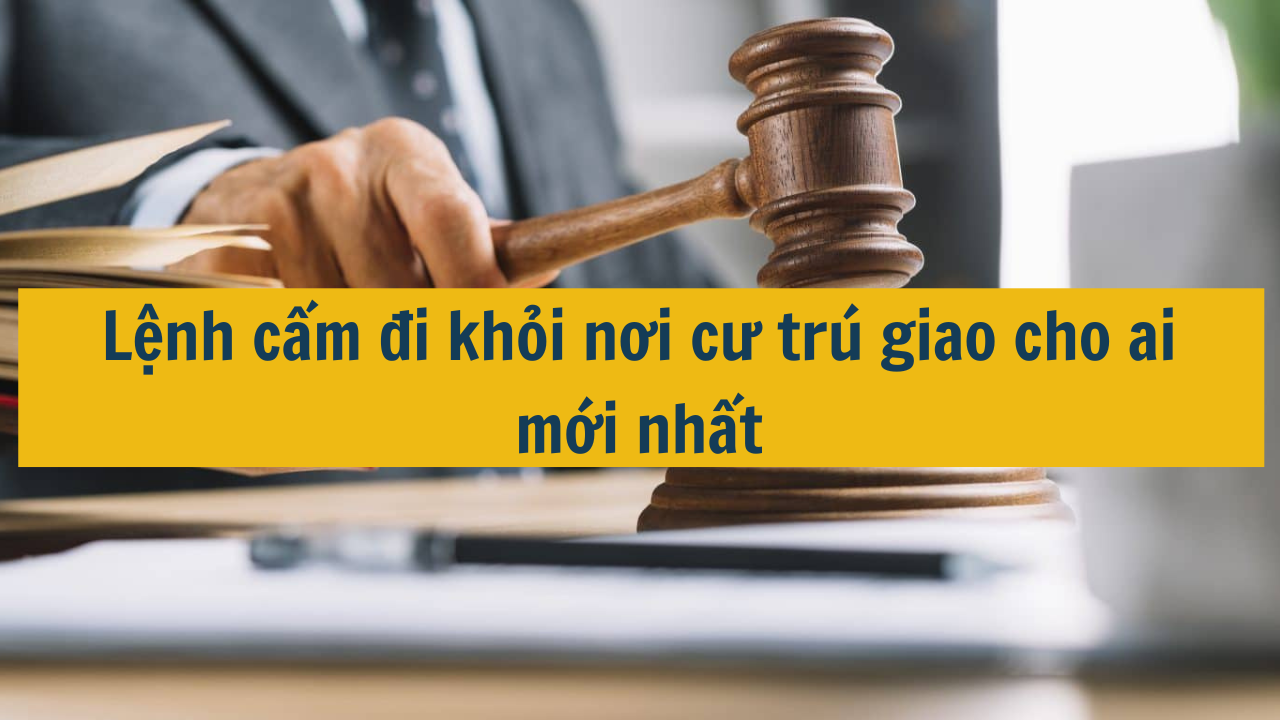
Lệnh cấm đi khỏi nơi cư trú giao cho ai năm 2025?
Lệnh cấm đi khỏi nơi cư trú thuộc thẩm quyền của ai. Bài viết sau đây sẽ làm rõ vấn đề này và các vẫn đề liên quan. 21/01/2025Thời hạn lệnh cấm đi khỏi nơi cư trú là bao lâu mới nhất năm 2025?
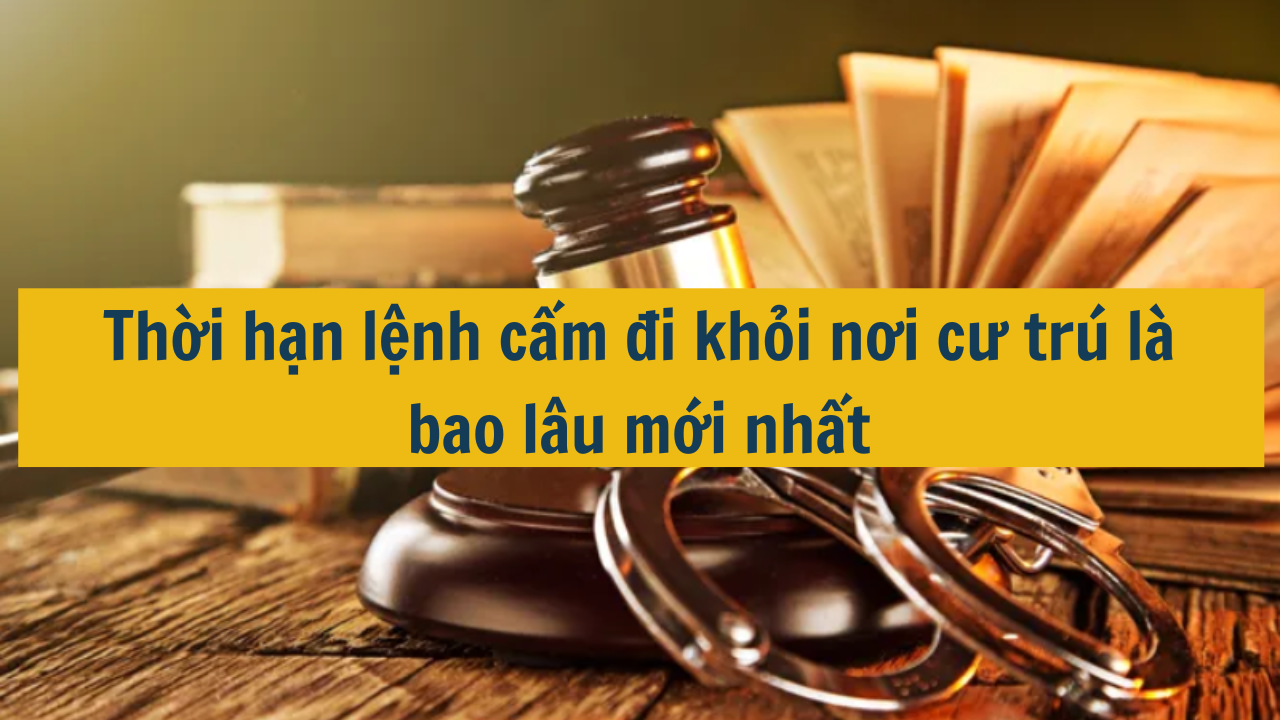
Thời hạn lệnh cấm đi khỏi nơi cư trú là bao lâu mới nhất năm 2025?
Người bị cấm đi khỏi nơi cư trú theo quy định của Bộ luật tố tụng hình sự 2015 sẽ bị hạn chế một số quyền, tuy nhiên vẫn có quy định về thời hạn của lệnh cấm đi khỏi nơi cư trú. Sau đây là bài viết về thời hạn lệnh cấm đi khỏi nơi cư trú là bao lâu mới nhất năm 2025 và các vấn đề liên quan. 21/01/2025Mẫu lệnh cấm đi khỏi nơi cư trú của Tòa án mới nhất năm 2025
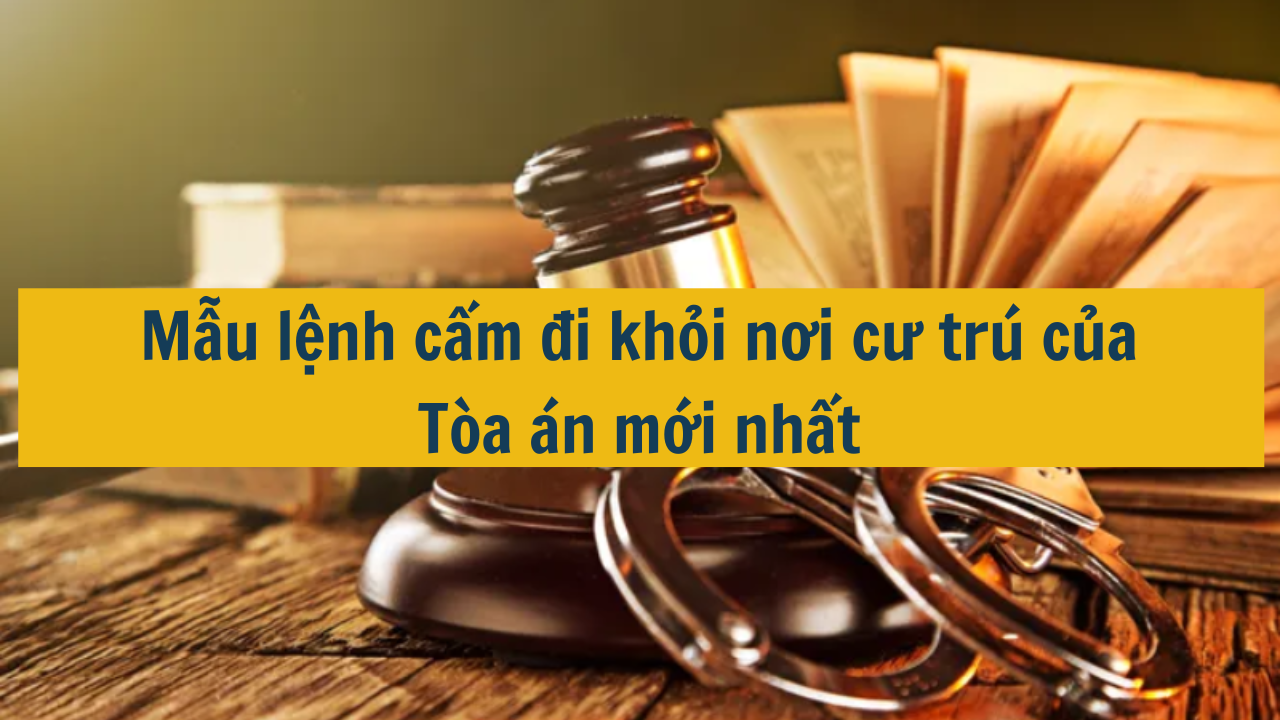
Mẫu lệnh cấm đi khỏi nơi cư trú của Tòa án mới nhất năm 2025
Người bị cấm đi khỏi nơi cư trú theo quy định của Bộ luật tố tụng hình sự 2015 sẽ bị hạn chế một số quyền. Sau đây là mẫu lệnh cấm đi khỏi nơi cư trú của Tòa án mới nhất 2025 và một số vấn đề liên quan. 21/01/2025Thế nào là cấm đi khỏi nơi cư trú? Ai có thẩm quyền ra lệnh cấm đi khỏi nơi cư trú mới nhất 2025?
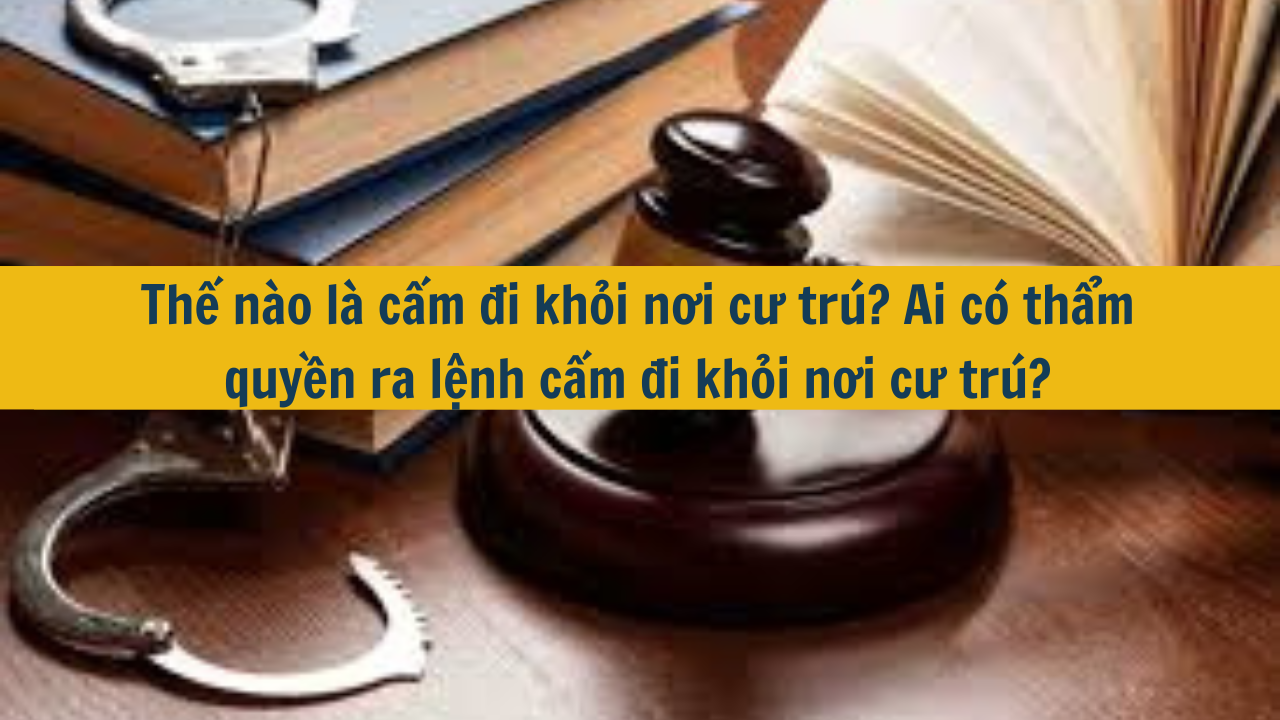
Thế nào là cấm đi khỏi nơi cư trú? Ai có thẩm quyền ra lệnh cấm đi khỏi nơi cư trú mới nhất 2025?
Cấm đi khỏi nơi cư trú, tạm giữ, tạm giam,.là những biện pháp ngăn chặn được quy đinh trong Bộ luật tố tụng hình sự 2015 với mục đích để kìm hãm sự phát triển của hành vi phạm tội. Vậy thế nào là cấm đi khỏi nơi cư trú? Ai có thẩm quyền ra lệnh cấm đi khỏi nơi cư trú ? Bài viết sau sẽ làm rõ những vấn đề này. 21/01/2025Đang bị cấm đi khỏi nơi cư trú có được đưa người thân đi cấp cứu ở xa năm 2025?

Đang bị cấm đi khỏi nơi cư trú có được đưa người thân đi cấp cứu ở xa năm 2025?
Người đang bị cấm đi khỏi nơi cư trú sẽ bị hạn chế một số quyền cơ bản của công dân. Tuy nhiên, trong những trường hợp đặc biệt, bất khả kháng người cấm đi khỏi nơi cư trú vẫn có thể thực hiện được quyền đi lại của mình. Bài viết sau đây sẽ làm rõ vấn đề đang bị cấm đi khỏi nơi cư trú có được đưa người thân đi cấp cứu ở xa năm 2025 không? 21/01/2025Cấm đi khỏi nơi cư trú có được đi làm không 2025?
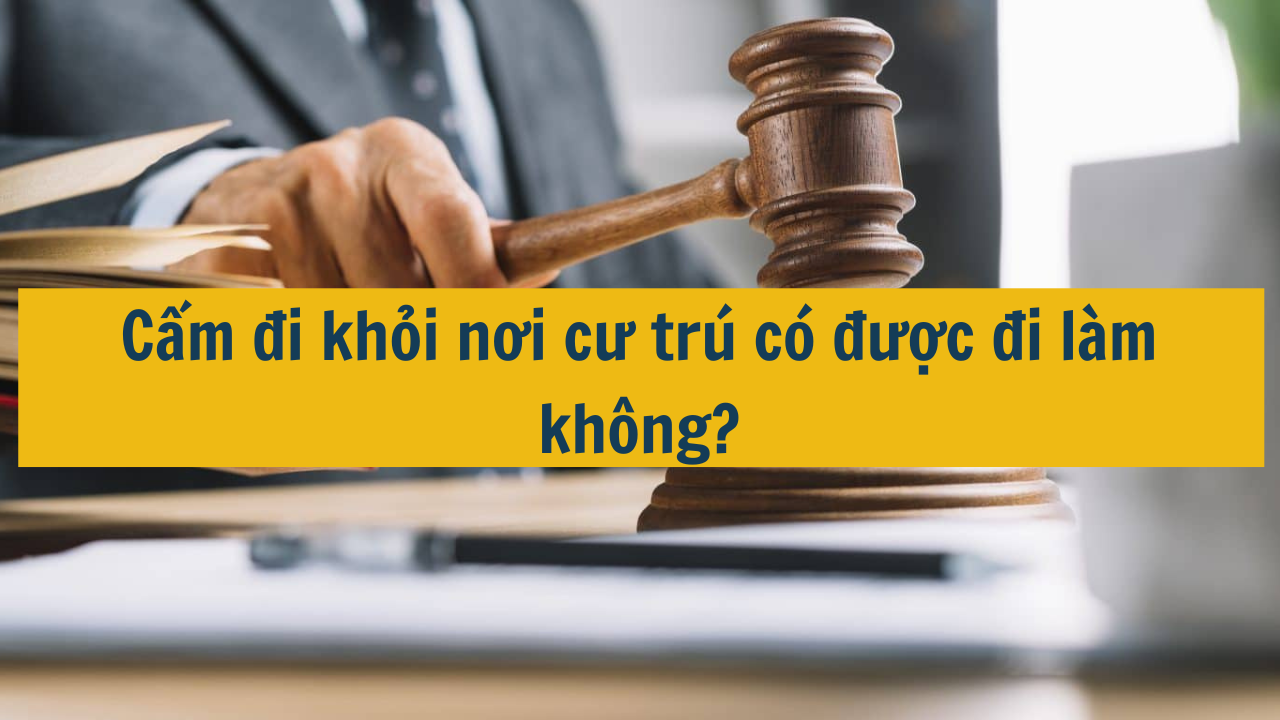
Cấm đi khỏi nơi cư trú có được đi làm không 2025?
Cấm đi khỏi nơi cứ trú là một trong những biện pháp ngăn chặn được quy định trong Bộ luật tố tụng hình sự. Vậy người bị cấm đi khỏi nơi cư trú bị hạn chế những quyền gì? Bài viết sau đây sẽ làm rõ vấn đề này. 21/01/2025Các trường hợp cấm đi khỏi nơi cư trú 2025?

Các trường hợp cấm đi khỏi nơi cư trú 2025?
Cấm đi khỏi nơi cư trú là một trong những biện pháp ngăn chặn đã được quy định trong Bộ luật Tố tụng Hình sự. Theo đó, quy định tại Điều 123 của Bộ luật Tố tụng hình sự năm 2015 đã quy định cụ thể nghĩa vụ của bị can, bị cáo được áp dụng biện pháp cấm đi khỏi nơi cư trú phải cam đoan; bổ sung thời hạn áp dụng đối với biện pháp cấm đi khỏi nơi cư trú. Bài viết sau đây sẽ làm rõ về biện pháp cấm đi khỏi nơi cư trú và các bài viết liên quan. 21/01/2025Cấm đi khỏi nơi cư trú là gì? 06 điều cần biết về cấm đi khỏi nơi cư trú mới nhất năm 2025?

Cấm đi khỏi nơi cư trú là gì? 06 điều cần biết về cấm đi khỏi nơi cư trú mới nhất năm 2025?
Luật Cư trú năm 2020 cơ bản kế thừa quy định của Luật hiện hành, đồng thời sửa đổi, bãi bỏ và làm rõ hơn các quy định trước đây nhằm bảo đảm tốt hơn nữa quyền tự do cư trú của công dân; góp phần nâng cao hơn nữa hiệu quả công tác quản lý nhà nước về an ninh, trật tự trong tình hình mới; thực hiện việc đơn giản hóa thủ tục hành chính, giấy tờ công dân liên quan đến công tác đăng ký, quản lý cư trú; đáp ứng yêu cầu ứng dụng khoa học, công nghệ tiên tiến trong công tác quản lý cư trú mà trọng tâm là xây dựng, quản lý cư trú qua Cơ sở dữ liệu quốc gia về dân cư. Bài viết sau đây sẽ làm rõ về chủ đề cấm đi khỏi nơi cư trú và các vấn đề xung quanh nó. 03/01/2025Phân biệt cách tính trợ cấp thôi việc và trợ cấp mất việc làm

Phân biệt cách tính trợ cấp thôi việc và trợ cấp mất việc làm
Trợ cấp thôi việc và trợ cấp mất việc làm là hai hình thức hỗ trợ tài chính khác nhau dành cho người lao động khi chấm dứt hợp đồng lao động. Mặc dù đều liên quan đến việc kết thúc công việc, nhưng cách tính và điều kiện hưởng của hai loại trợ cấp này có những điểm khác biệt rõ rệt. Cùng xem bài viết Phân biệt cách tính trợ cấp thôi việc và trợ cấp mất việc làm dưới đây để hiểu rõ hơn về 02 loại trợ cấp này. 18/11/2024Quy định về giữ người trong trường hợp khẩn cấp theo Bộ luật Tố tụng hình sự 2015


 Bộ luật Tố tụng hình sự 2015 (Bản Pdf)
Bộ luật Tố tụng hình sự 2015 (Bản Pdf)
 Bộ luật Tố tụng hình sự 2015 (Bản Word)
Bộ luật Tố tụng hình sự 2015 (Bản Word)